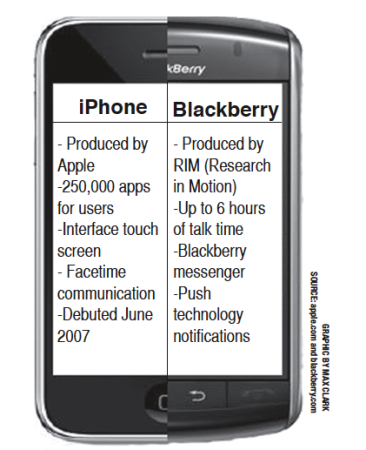Ever since the introduction of the iPhone, Smartphone popularity continues to surge as manufacturers release the latest advanced technology. In the past few years, the U.S. Smartphone market has grown significantly. The market grew 37.9 percent from 2009 to 2010. Research in Motion owns the largest portion of the market, but along with Apple, its share continues to decrease while Google’s share continues to increase with the introduction of the Android.
Apple’s iPhone debuted in June 2007 and rapidly gained popularity with its sleek design and appealing Apps that now number in the tens of thousands. The App system features Apps for both practical uses, such as navigation or weather updates, and unusual uses, such as checking the lengths of theme park attraction lines. However, its questionable cellular reception sparked much controversy recently. Apparently, touching the antenna area in the bottom-left corner of the iPhone 4 inhibits the phone’s reception.
According to an April 2010 J.D. Power and Associates Survey, Apple has the highest customer satisfaction level among smartphone makers. On a 1,000-point scale, Apple posted a score of 810, while RIM posted a score of 741.
“I prefer the iPhone, because it has more apps than the Blackberry. The iPbone also has a music player, making it better for entertainment,” sophomore Jesse Liu said.
RIM’s Blackberry debuted in 1999 and featured newer technology over time. The Blackberry includes an advanced messaging system, electronic mail, and a touch keyboard, a feature that the iPhone lacks, but the Blackberry lacks an advanced App system compared to the iPhone. RIM released its newest Blackberry phone-the Blackberry Torch-in August 2010.
“I like the Blackberry because it comes with all sorts of features and has proven to be extremely reliable. All of your personal information or text messages are organized into different parts of the phone and it provides a 24-hour way to access the Internet to check out sports scores,” sophomore Derek Chait said.
A direct comparison between the iPhone and the Blackberry suggests that people who mostly use media features and find battery life important should stick with the iPhone, while those who need a physical keyboard and management features should stick with the Blackberry.
Also, according to the survey, 17 percent of smartphone owners with touch-screen equipped hand sets indicate that they frequently download and watch video content on their device.
According to The Nielsen Company, Smartphone sales accounted for 25 percent of the U.S. mobile phone market in the second quarter and is projected to account for more than 50 percent of the U.S. market by the end of 2011. Smartphone manufacturers sold a total of 174 million phones worldwide during 2009, which was 23 million more than the 151 million sold in 2008.



